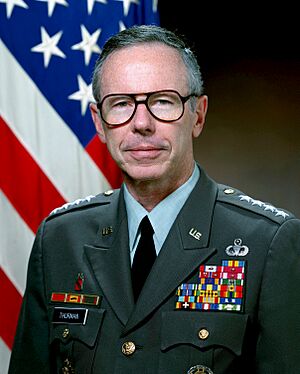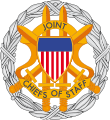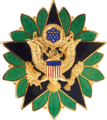Maxwell R. Thurman facts for kids
Quick facts for kids
Maxwell R. Thurman
|
|
|---|---|

General Maxwell Reid Thurman
|
|
| Nickname(s) | "Mad Max" "Maxatollah" |
| Born | February 18, 1931 High Point, North Carolina, US |
| Died | December 1, 1995 (aged 64) Walter Reed Army Medical Center, Washington, D.C., US |
| Buried | |
| Allegiance | United States |
| Service/ |
United States Army |
| Years of service | 1953–1991 |
| Rank | General |
| Commands held | United States Southern Command United States Army Training and Doctrine Command Vice Chief of Staff of the United States Army United States Army Recruiting Command 2d Howitzer Battalion, 35th Field Artillery Regiment |
| Battles/wars | 1958 Lebanon crisis Vietnam War Invasion of Panama |
| Awards | Defense Distinguished Service Medal Army Distinguished Service Medal (2) Legion of Merit (2) Bronze Star Medal (2) |
| Relations | Lieutenant General John R. Thurman III (brother) |
Maxwell Reid Thurman (born February 18, 1931 – died December 1, 1995) was a highly respected United States Army general. He held important leadership roles, including serving as the second-highest ranking officer in the Army and leading the command responsible for training soldiers. General Thurman was known for his strong work ethic and was sometimes called "Mad Max."
Contents
Early Life and Education
Maxwell Thurman grew up in High Point, North Carolina. He attended North Carolina State University, where he studied chemical engineering, focusing on ceramics. While in college, he was part of the Theta Tau engineering fraternity.
A Career in the Army
After graduating from college in 1953, Maxwell Thurman joined the Army as a second lieutenant. He became an officer in the Field Artillery branch, which uses large guns and rockets. His first assignment was with the 11th Airborne Division. In 1958, his unit, which used Honest John Rockets, was sent to Lebanon during a time of crisis.
From 1961 to 1963, Thurman served in South Vietnam as an intelligence officer. After this, he became a tactical officer at the United States Military Academy (West Point). This was a special assignment because few officers who didn't graduate from West Point were chosen for this role. In 1967, he returned to South Vietnam and commanded a howitzer battalion.
Leading Important Army Commands
After more training at the United States Army War College in 1970, Thurman took on many different leadership jobs. In 1979, he became the head of the United States Army Recruiting Command. Here, he started the very famous "BE ALL YOU CAN BE" recruiting campaign. This campaign helped improve the Army's image after the Vietnam War and attracted many new, motivated recruits.
From 1981 to 1983, he was the Army's Deputy Chief of Staff for Personnel. Then, from 1983 to 1987, he served as the Vice Chief of Staff of the United States Army. This made him the second-highest ranking officer in the entire Army.
In 1989, General Thurman was planning to retire. However, President George H. W. Bush personally chose him to lead the United States Southern Command (USSOUTHCOM). In this role, he was in charge of planning and carrying out Operation Just Cause. This was the 1989 mission to invade Panama.
Later Life and Passing
Soon after leading Operation Just Cause, General Thurman was diagnosed with a serious illness called acute myelogenous leukemia. He retired from the Army in 1991, after serving for more than 37 years.
General Thurman passed away in 1995 at the Walter Reed Army Medical Center in Washington, D.C., at the age of 64. He was buried with military honors at Arlington National Cemetery. He never married and was survived by his brother, Lieutenant General John R. Thurman III, who also served in the Army.
Honors and Legacy
General Thurman received many important awards for his service. These include the Defense Distinguished Service Medal, the Army Distinguished Service Medal, the Legion of Merit, and the Bronze Star Medal. In 2010, he was honored by being added to the Theta Tau Alumni Hall of Fame.
An award is given each year in his honor by the United States Army Medical Research and Materiel Command. This award recognizes achievements in military medicine.
General Thurman was known for being a hard worker and a brilliant organizer. His leadership of the Army Recruiting Command is seen as a key reason why the Army was able to rebuild its image and attract new generations of soldiers after the Vietnam War.
Images for kids
 | Emma Amos |
 | Edward Mitchell Bannister |
 | Larry D. Alexander |
 | Ernie Barnes |




